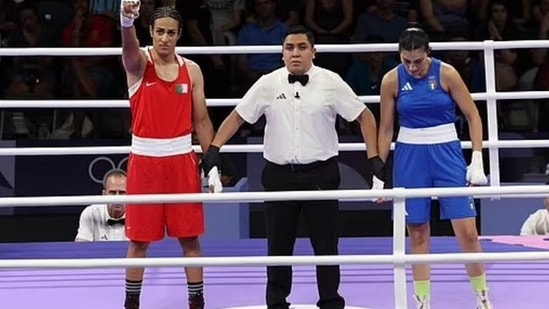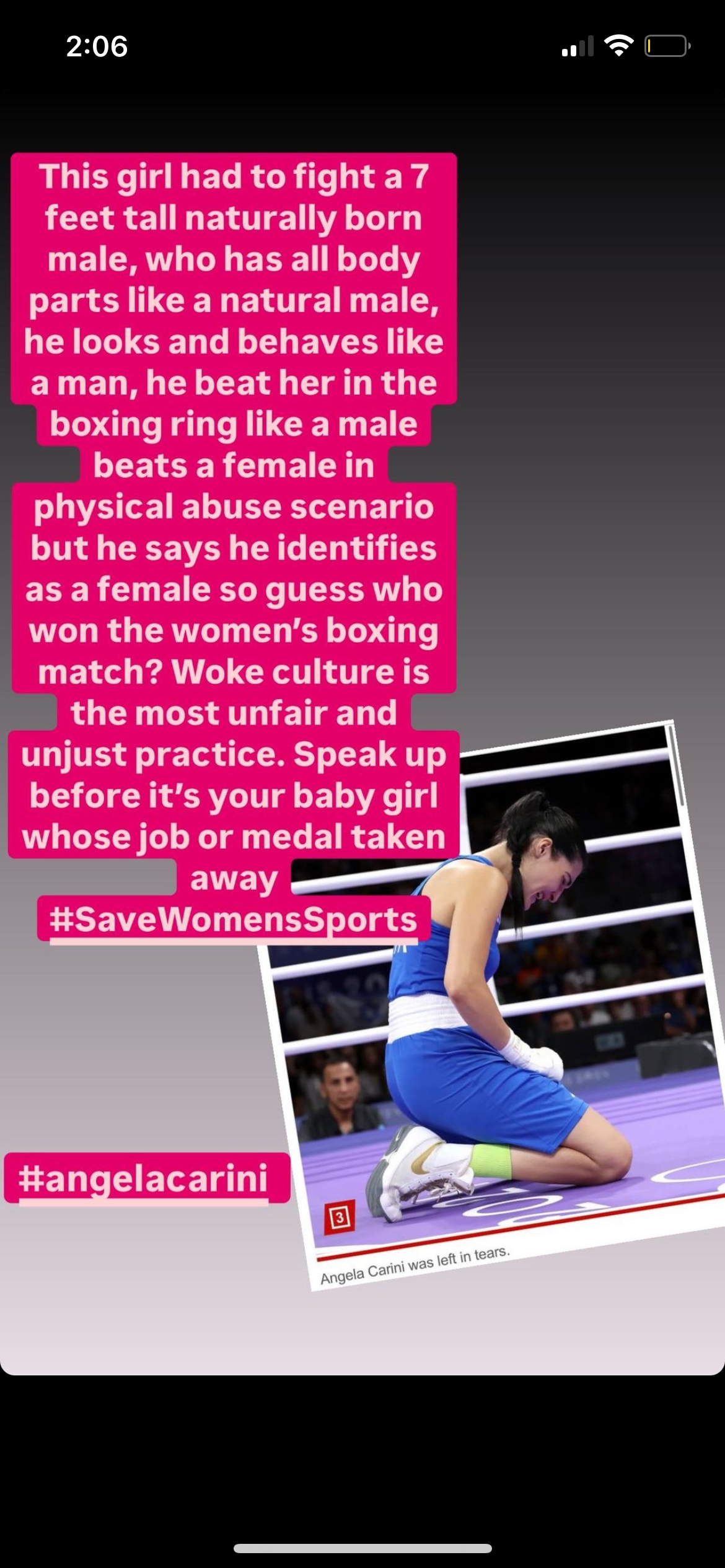Khelif vs Carini: Gender eligibility debate intensifies at Paris Olympics 2024
The incident has caused a stir igniting a debate on gender eligibility as many have criticised the International Olympic Committee for its criteria
On Thursday, during the Olympic boxing event, Imane Khelif of Algeria, who last year failed a gender eligibility test, won her first match against Italian boxer Angela Carini after just 46 seconds in a 66-kilogram bout. The incident has caused a significant stir in the sports industry, igniting a debate on gender eligibility as many have criticized the International Olympic Committee for its criteria.

Carini faced several punches within her first 30 seconds. A powerful blow to her nose caused her to raise her hand and move to a corner. A dislodged chinstrap left her bleeding, prompting her coach, Emanuele Renzini, to indicate that she would be pulling out of the match. Heartbroken, Carini fell to her knees in the ring and refused to shake hands with Khelif as she was declared the winner.
In press interviews later, Carini made a statement: “I am a fighter. My father taught me to be a warrior. When I am in the ring, I use that mindset, the mindset of a warrior, a winning mindset.” She added, “This time I couldn’t make it. I didn’t lose tonight; I just surrendered with maturity.”
25-year-old Carini, in an interview with Reuters, said, “I’m out, my dream is over. I felt really sad, with a broken heart. It’s not right for my Olympics to end here; it’s not right for my dream to end here, because an athlete makes so many sacrifices. I’m not ashamed to say that I gave up; I’m not even afraid to go back to that ring.”
After a huge uproar online over the controversy, the International Olympic Committee issued an official statement:
“As with previous Olympic boxing competitions, the gender and age of the athletes are based on their passport. We have seen misleading reports about two female athletes competing at the Olympic Games Paris 2024. The two athletes have been competing in international boxing competitions for many years in the women’s category. The current aggression against these two athletes is based entirely on this arbitrary decision, which was taken without any proper procedure—especially considering that these athletes had been competing in top-level competition for many years.”
Expert opinion:
“Determination of sex is a complex process that depends on many genes and hormones and starts from embryonic life. Impairment of many of these genes creates a difference in chromosomal sex (XX or XY) and the visible sex or the sex identified at birth. In the current controversy, as the actual genetic defect has not been revealed, it is difficult to know whether the elevated testosterone levels have contributed to increased strength,” shares Dr Swasti Pal, Associate Consultant in Medical Genetics at the Institute of Medical Genetics and Genomics at Sir Ganga Ram Hospital.
Dr Pal explains that DSD arises when there is a discrepancy between the two types of sex identified in medicine: chromosomal sex (e.g., XY chromosomes) and internal (ovaries or testes) and external (visible) sex characteristics. Whenever there is a mismatch, it is classified as a DSD. In this case, while she has declared herself as female, tests have shown her to be XY. Whether that Y chromosome is functional or not has not been declared. If she has a Y chromosome but no functional testes, it has been declared, and based on that, testosterone levels are high and may or may not be functional like in males.
Regarding her participation in women’s boxing, Dr Pal said that it is becoming controversial because it is known that she is XY. There are considerations to be made. She may be XY with normal female-like muscle mass, and high testosterone levels may or may not affect this. The specific DSD she has needs to be determined. If she has a condition where, despite appearing female, she has muscle mass comparable to that of males, this needs to be taken into account. The ethical board must understand that each genetic disorder is different and cannot apply a blanket rule.
In the past:
Imane Khelif, who earned a silver medal at the International Boxing Association’s 2022 global championship, and another female boxer, Lin Yu-tin from Taiwan, who won the IBA world championships in 2018 and 2022, were disqualified from the 2023 World Championships in Delhi as they both failed the International Boxing Association eligibility rules that prevent athletes with male XY chromosomes from competing in women’s events. Both boxers had already competed in the 2020 Tokyo Olympics.
How celebs have reacted so far:
Author and popular critic of transgender issues, J.K. Rowling, took to X to criticize the IOC for allowing the Algerian boxer to participate in the tournament. “The smirk of a male who knows he’s protected by a misogynist sporting establishment enjoying the distress of a woman he’s just punched in the head, and whose life’s ambition he’s just shattered,” she wrote on X.
Tech mogul Elon Musk endorsed a post from anti-trans activist and swimmer Riley Gaines that claimed “men don’t belong in women’s sports” by resharing it with the message: “Absolutely.” He also requoted a tweet saying, “Kamala Harris supports this” by commenting, “True or let her deny it.”

Indian politician and actor Kangana Ranaut also commented on the incident. “This girl had to fight a 7-foot-tall naturally born male, who has all body parts like a natural male, who looks and behaves like a man. He beat her in the boxing ring like a male beats a female in a physical abuse scenario, but he says he identifies as female, so guess who won the women’s boxing match? Woke culture is the most unfair and unjust practice. Speak up before it is your baby girl whose job or medal is taken away. #SaveWomenSports,” she wrote on Instagram stories.
Meanwhile, Italian Prime Minister Georgia Meloni also expressed support for her countrywoman’s honor. “I think that athletes who have male genetic characteristics should not be admitted to women’s competitions,” she said to the Italian press.
Shortly after, she met Carini and tweeted a photo on X: “I know that you won’t give up, Angela, and I know that one day you will get what you deserve through strength and sweat. In a competition that is finally equal,” she wrote.
Indian female athletes who have been accused of similar physical nature:
Pinky Pramanik: A track and field athlete who won several medals at the Commonwealth Games, Asian Games, and South Asian Games, was accused of rape by a friend. However, a medical report later declared Pramanik incapable of having penetrative sex. In an interview, Pramanik revealed that she was given testosterone injections by her trainers, which she claimed were “regularly administered testosterone injections like other female participants.”
Dutee Chand: A track and field athlete who was dropped from the 2014 Commonwealth Games contingent at the last minute after the Athletic Federation of India stated that hyperandrogenism made her ineligible to compete as a female athlete. Following the Commonwealth Games, she was also dropped from the Indian contingent for the 2014 Asian Games. Chand appealed to the Court of Arbitration for Sport (CAS) in 2015, and the International Amateur Athletic Federation’s (IAAF) policy on hyperandrogenism, or high natural levels of testosterone in women, was suspended. The ruling found a lack of evidence that testosterone increased female athletic performance.
Nandini Agasara: A heptathlete who was referred to as “transgender” by another Indian athlete, Swapna Barman, after Agasara beat Barman to a bronze medal in the 2023 Asian Games in Hangzhou, China. Barman later apologized unconditionally for her remarks.






